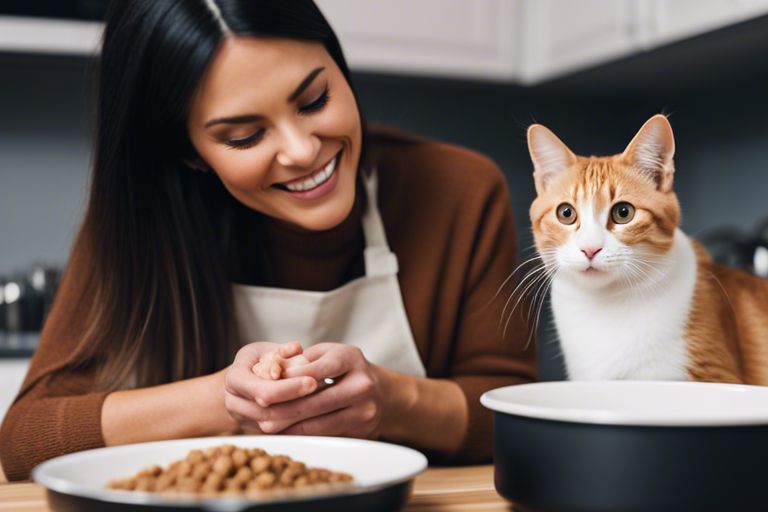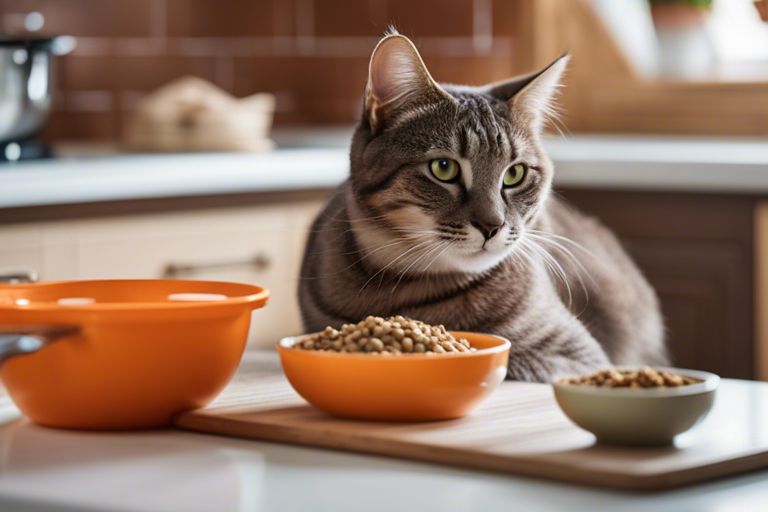Dealing with digestive issues in your cat can be a frustrating and concerning experience. However, it’s important to remain vigilant and take action to address the problem before it becomes more serious. There are several ways you can help your cat with digestive issues, from making changes to their diet to providing them with the right supplements. In this blog post, we’ll explore some of the most effective strategies for improving your cat’s digestive health and ensuring they stay happy and healthy.
Key Takeaways:
- Consult a Veterinarian: If your cat is experiencing digestive issues, it’s important to seek professional advice from a veterinarian to determine the underlying cause and appropriate treatment.
- Provide a High-Quality Diet: Offer your cat a high-quality, easily digestible diet that is appropriate for their specific needs, such as a high-protein, low-carbohydrate formula.
- Avoid Sudden Dietary Changes: Gradually transition your cat to a new diet to prevent digestive upset, and avoid offering human food or treats that may disrupt their digestive system.
- Consider Digestive Supplements: Some cats may benefit from digestive supplements, such as probiotics or digestive enzymes, to support their gastrointestinal health.
- Monitor Your Cat’s Health: Keep a close eye on your cat’s eating habits, litter box habits, and overall well-being, and seek veterinary care if you notice any ongoing or concerning digestive issues.

Recognizing Digestive Problems
Obviously, it’s essential to recognize when your cat is experiencing digestive issues. Understanding the signs of digestive distress can help you take the necessary steps to improve your cat’s gut health. If you’re looking for more tips on how to improve your cat’s gut health, you can check out this article on 8 Tips to Improve Your Cat’s Gut Health & Microbiome – Purina.
Symptoms of Digestive Distress
When your cat is experiencing digestive distress, you may notice symptoms such as vomiting, diarrhea, constipation, lack of appetite, weight loss, or lethargy. It’s important to pay attention to these signs, as they can indicate a more serious underlying issue with your cat’s digestive system. If you notice any of these symptoms, it’s crucial to take action to address the problem and ensure your cat’s well-being.
When to Visit the Vet
If you notice persistent or severe symptoms of digestive distress in your cat, it’s important to seek veterinary care immediately. Digestive issues can be a sign of a more serious underlying health problem, and it’s crucial to have your cat evaluated by a professional. Your vet can help determine the underlying cause of the issue and develop a treatment plan to improve your cat’s digestive health.
Dietary Management
Some digestive issues in cats can be managed through dietary changes. By carefully selecting the right type of food and considering the role of probiotics and supplements, you can help alleviate your cat’s digestive discomfort and promote overall digestive health.
Choosing the Right Food for Digestive Health
When it comes to choosing the right food for your cat with digestive issues, opt for high-quality, easily digestible options. Look for cat food that is specifically formulated for digestive health, with ingredients such as digestible proteins, limited fillers, and essential nutrients. Avoid foods with artificial colors, flavors, and preservatives as these can exacerbate digestive issues. Additionally, you may want to consider eliminating common allergens such as grains or certain proteins from your cat’s diet to see if this has a positive impact on their digestive health.
The Role of Probiotics and Supplements
Probiotics can play a significant role in promoting a healthy gut flora in your cat, potentially reducing digestive issues. Consider incorporating a high-quality feline-specific probiotic supplement into your cat’s diet to support their digestive health. Additionally, certain supplements such as digestive enzymes can aid in the breakdown of nutrients and promote better digestion. It is important to consult with your veterinarian before adding any new supplements to your cat’s diet to ensure they are appropriate for your cat’s specific needs.
Home Care and Remedies
To help your cat with digestive issues at home, there are several care and remedies you can try. By providing a stress-free environment and incorporating natural remedies, you can help alleviate your cat’s digestive problems and improve their overall well-being.
Creating a Stress-Free Environment
Cats can be sensitive to their environment, and stress can exacerbate digestive issues. To create a stress-free environment for your cat, ensure they have a quiet and comfortable space to rest and relax. Provide them with their own bed or designated area where they can retreat to when they need some peace and quiet. Additionally, try to minimize any sudden changes or disruptions in their routine, as this can contribute to stress and digestive upset.
Natural Remedies and Their Efficacies
There are several natural remedies that can help support your cat’s digestive health. Probiotics, for example, can help promote the growth of beneficial gut bacteria, aiding in digestion and reducing inflammation. You can also consider adding digestive enzymes to your cat’s food to help break down nutrients and improve absorption. Incorporating high-fiber foods, such as pumpkin or psyllium husk, can also help regulate your cat’s digestive system and alleviate issues such as constipation. It’s important to consult with your veterinarian before introducing any new remedies to ensure they are safe and appropriate for your cat’s specific needs.
Long-Term Digestive Health Strategies
Your cat’s digestive health is essential for overall well-being. To help maintain your cat’s digestive health in the long term, there are several strategies you can implement to prevent and manage digestive issues.
Preventative Measures for Digestive Issues
One of the most important steps in supporting your cat’s long-term digestive health is to provide a balanced and nutritious diet. Choose high-quality cat food that is easily digestible and free from artificial additives. Additionally, make sure your cat has access to plenty of fresh water to prevent dehydration, which can exacerbate digestive issues. Avoid feeding your cat table scraps or human food, as these can disrupt their digestive system and lead to gastrointestinal upset.
Monitoring and Maintaining Digestive Wellness
Regular monitoring of your cat’s digestive wellness is crucial for early detection of any potential issues. Keep an eye on your cat’s litter box habits and note any changes in frequency, consistency, or odor of their stools. If you notice any abnormalities, such as diarrhea, constipation, or vomiting, it’s important to seek veterinary attention promptly. Additionally, maintaining a healthy weight for your cat through regular exercise and portion control can help prevent obesity-related digestive issues.
How can I help my cat with digestive issues?
With these considerations in mind, you can take steps to help your cat with digestive issues. First, ensure they have a balanced diet tailored to their specific needs and digestive sensitivities. This may involve switching to a high-quality, easily digestible cat food. Additionally, consider providing probiotics or digestive enzymes to support gut health. Be mindful of portion sizes and avoid giving them too many treats or table scraps. Lastly, regular exercise and plenty of fresh water can also contribute to a healthy digestive system for your cat. By implementing these strategies, you can help improve your cat’s digestive health and overall well-being.
FAQ
Q: What are common signs of digestive issues in cats?
A: Common signs of digestive issues in cats include vomiting, diarrhea, constipation, loss of appetite, weight loss, and changes in litter box habits. If you notice any of these signs in your cat, it’s important to consult with a vet for a proper diagnosis.
Q: How can I help my cat with digestive issues?
A: To help your cat with digestive issues, it’s important to feed them a high-quality diet that is easily digestible and appropriate for their age and health. You can also consider adding probiotics to their diet, providing plenty of fresh water, and minimizing stress in the environment. Additionally, consult with your vet to determine if there are any underlying medical issues that may be contributing to the digestive issues.
Q: When should I seek veterinary help for my cat’s digestive issues?
A: If your cat is showing signs of digestive issues, it’s important to seek veterinary help as soon as possible. Persistent vomiting, diarrhea, or constipation, along with other symptoms such as lethargy, dehydration, or blood in the stool, may indicate a more serious underlying issue that requires immediate attention. Your vet can perform diagnostic tests to determine the cause of the digestive issues and recommend appropriate treatment.

Jayley, a devoted cat enthusiast, also writer for other cat blog as well. She aims to dedicated to providing comprehensive information, insights, and advice on everything you’d ever want to know about our whiskered companions.
